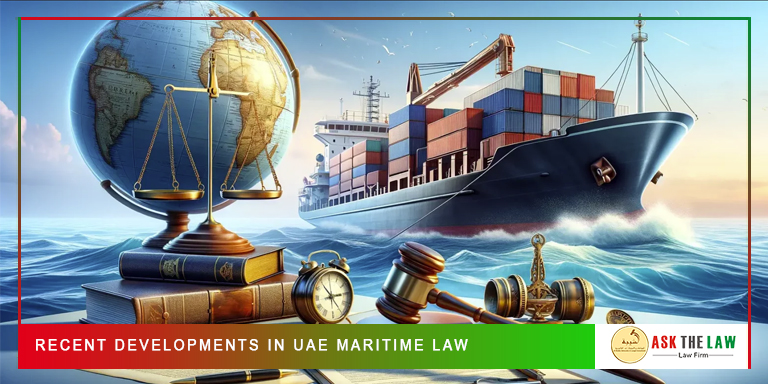
Recent Developments in UAE Maritime Law
When it comes to trade and commerce in the world, United Arab Emirates is thought to be one of the most successful countries. Why? The country has amazing international trade routes with extensive coastlines and modern ports, ensuring successful global maritime activities. However, like other trading laws, UAE maritime laws are governed under certain rules. Activities such as shipping and marine trade are covered under maritime laws.
Legal Framework of UAE Maritime Law
To understand the maritime industry, you should know that activities related to the sea are known as maritime activities. The UAE’s maritime laws regulate maritime contracts, insurance, and shipping operations. You can read the rules on government’s official web portal, or you can also consult our lawyers.
How Does UAE Maritime Law Work?
The marine industry in the UAE is significant to its economy. The country’s strategic location has invited many traders for import and export businesses in the UAE. Let’s take a look at some features according to which maritime laws are governed in the UAE:
- Vessel Registration
Illegal vessels will have serious penalties. Therefore, every vessel in the sea within the UAE waters must be registered with the relevant authorities. However, some vessels cannot be owned by a foreigner.
- Shipping Contracts
The shipping contracts outline the roles and responsibilities of the shipowners, charters and cargo owners, ensuring smooth maritime business in the UAE. These contracts have to be drafted by maritime law lawyers. Ask The law provides you the top lawyers for such legal requirements.
- Marine Insurance
Just like other types of insurance on the ground, marine insurance is also drafted to protect shipowners from financial losses that may occur due to accidents or other risks involved in sea trades. In most cases, marine insurance is useful for machinery insurance, cargo insurance, and liability insurance.
- Liability and Compensation
Maritime law resolves disputes over personal injury, cargo damages, and environmental harm. Moreover, it provides compensation solutions to shipowners and stakeholders.
- Maritime Liens
Maritime law grants creditors permission to claim if the vessel is damaged or they have unpaid debts.
- Accidents in the Sea
The maritime law outlines the process for investigating accidents in the sea, such as collisions between vessels. The UAE maritime law also governs rescue operations and compensation for crew in distress. For legal help, you can reach to maritime lawyers in Dubai.
Meeting Global Maritime Standards
The UAE’s maritime has ensured that it is operated according to international conventions by signing those conventions for the safety of the ships, crews and passengers in the sea. However, the conventions also facilitate the UAE maritime activities by doing rescue operations if needed. In addition, pollution in the sea is also being tried to be avoided by signing one of the conventions. The coastal states and boundaries are also ensured through those conventions.
Dispute Resolution in Maritime
The maritime industry may also have disputes that are complicated and have technical issues. There are various methods to resolve disputes in the UAE maritime industry. Litigation is a conventional way to resolve the issue as it involves courts. The maritime courts are established to resolve issues related to sea activities. However, other than litigation, alternative dispute resolution (ADR) methods have also been tried. The new lawyers in the UAE have opted for ADR techniques. It includes mediation, arbitration and negotiation. These kinds of settlements are made out of court. In most cases, amicable settlements are made with the mutual consent of both parties.
How does UAE maritime law ensure environmental protection?
The law ensures the environmental protection and maritime safety in different ways:
- Pollution Control
Stringent practices have been followed to release contaminants from vessels, including grease, chemicals, and debris. A special convention has been signed to take preventive measures to control pollution in the sea and respond to such incidents in a timely manner.
- Safety Standards
Maritime law ensures safety for the ship, crew, and passengers by training them to enter vessels. However, regular inspections and certifications ensure safety standards in the maritime industry.
- Maritime Emergency Response
The UAE has created systems that respond to emergency situations in the maritime sector, especially when search and research operations are involved. International conventions are also signed with the UAE maritime industry, which boosts the country’s confidence in its ability to be prepared for maritime crises.
Impact of Maritime Law on the UAE Businesses
The international routes from the sea in the UAE have implications for the UAE businesses that are operated in the maritime sector:
- Compliance Requirements
Businesses should ensure that they have a registered vessel to run business operations smoothly. Moreover, these companies should also have insurance and comply with environmental factors; they should work on ways to lessen pollution in the sea.
- Contractual Obligations
Companies trading through UAE waters must confirm that their contracts comply with UAE maritime law to avoid any conflict in the near future.
- Prospects of Business Growth
With the modern ports in the UAE, businesses can expand their operations across the UAE.
- Risk Management
Insurance contracts help businesses to mitigate the risks associated with the sea activities.
Problems with Maritime Law
Considering that the UAE has a strategic location for the sea routes, there are challenges to businesses:
- Unresolved Jurisdictions
The laws related to the UAE maritime overlap with federal, international, and free zone laws, which creates problems with international conventions.
- Developments in the Rules
The maritime industry and laws are constantly evolving. Businesses must ensure they constantly comply with UAE maritime law for sea trade.
- Cross-Border Conflicts
Resolving issues in multiple jurisdictions can be difficult, especially when the laws are not the same for every jurisdiction, and compliance with international shipping regulations may also be difficult.
Changes in the Maritime
The maritime industry is experiencing several changes, and it might be difficult for it to adapt to those changes. However, the most significant change is digital transformation. The UAE is working on paperless work to create a better environment. Hence, vessel registration can be processed easily online on digital platforms. To create eco-friendly shipping practices in the UAE, the maritime industry has taken some initiatives to contribute to the sustainability goals.
UAE’s Maritime Industry
The maritime industry in the UAE is working hard to meet sustainability goals and manage innovative strategies effectively, especially by training crews and complying with international conventions.
Is the Maritime Industry Good for the UAE?
With so many businesses opening in the UAE and digital transformation taking place, why not upgrade the sea activities to increase trade revenues? Therefore, the UAE government has signed international conventions to ensure its sea trade activities comply with global maritime standards.
UAE Maritime Safety Standards
If the maritime industry meets the sea commerce industry’s international standards, the crew and ships are safe in the UAE. However, if there is any dispute regarding the vessel or compensation for the damages, the lawyers can resolve these problems through mediation and negotiation.
Green Initiatives in the UAE
The UAE’s business sector is taking several initiatives to contribute to the sustainability goals. For example, banks are providing loans to businesses working on climate change in the UAE. In the same way, the maritime industry is also thoughtful of the environmental effects that it can have on the sea. Therefore, it ensures that ships release pollutants properly, which may reduce the pollution in the sea.
Arbitration in the UAE Maritime Industry
The arbitration rules in the UAE maritime industry have strengthened trade in the international market. Crew members will not suffer or have to wait for the court’s verdict. They can settle disputes out of court by agreeing to terms and conditions with mutual understanding of both parties. Trading through the sea in the UAE could be a great experience for many investors and entrepreneurs who already know the rules of sea trading.


